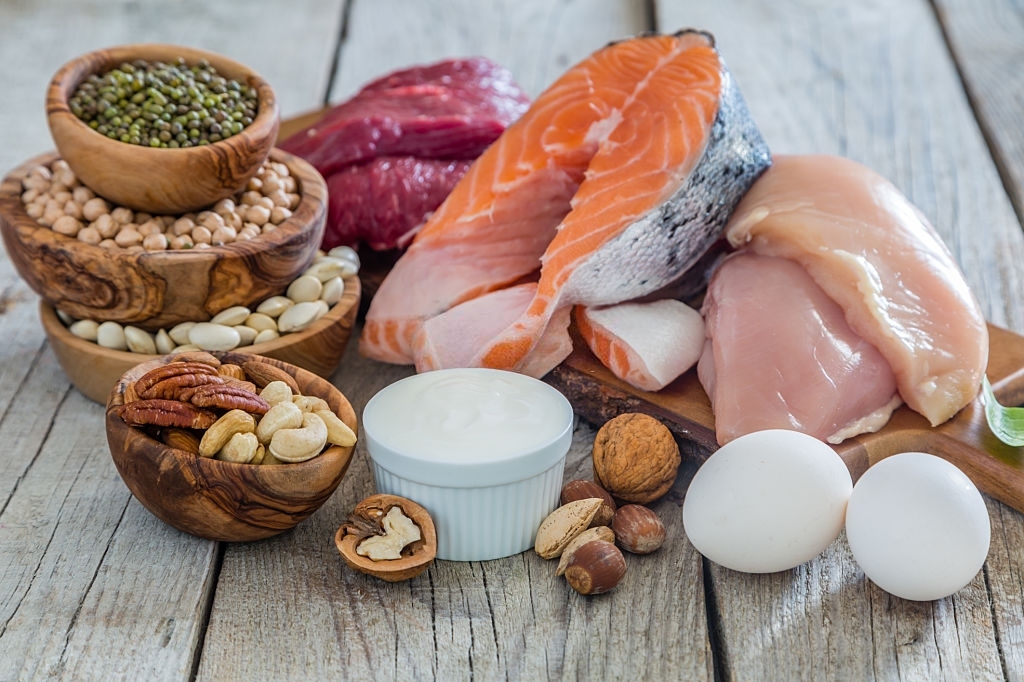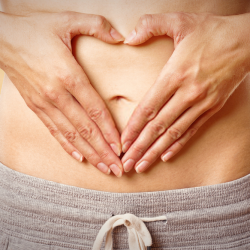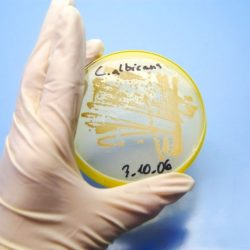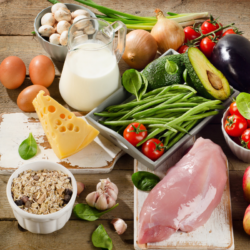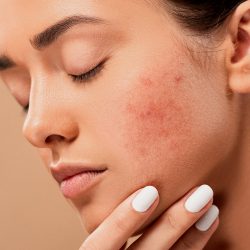Proteins are essential for the manufacture of tissues such as bones and muscles, for cell renewal, for the proper functioning of organs, as well as for the synthesis of enzymes and hormones. They are digested in the stomach, which is an acidic environment.
They are found in meats, dairy products, fish, sprouted seeds, eggs, oilseeds (almonds, hazelnuts, walnuts…), legumes and algae.
From digestion to protein assimilation:
Digestion divides proteins into amino acids, which will be transported to the liver. This will take part of it for its personal use and distribute the rest in the body.
Amino acids are assimilated by cells thanks to the insulin produced in the presence of glucose. It is therefore important to consume carbohydrates with proteins so that the latter can be assimilated.
To avoid a bad association, still prefer vegetables to starchy foods.
The cells fed by the proteins will produce organic proteins (enzymes, hormones, antibodies, neurotransmitters, etc.)
Be aware that a deficiency in amino acids is catastrophic for the body and leads to many disorders, such as muscle loss, hormonal imbalance or even a drop in immunity …
Some examples of amino acids:
- Tryptophan:
It is the basis of the secretion of serotonin, which is the hormone of sleep, relaxation, as well as a natural antidepressant. Not being synthesized by the body, it therefore comes only from the diet. It is found, for example, in dehydrated and salted cod, meat, pumpkin seeds, Parmesan, Gruyère or even milk.
- Phenylalanine:
Precursor of dopamine (associated with pleasure), and norepinephrine (which plays a role in concentration), it conditions the use of vitamin C, relieves muscle pain and headaches. This amino acid is used by the thyroid gland. It is found in meats, egg white, chickpeas, cheese, soy, oats or even wheat germ.
Dopamine and norepinephrine stimulate brain function and combat the effects of stress.
A deficiency of these neurotransmitters causes a decrease in libido, decreases appetite, memory and concentration. Phenylalanine is said to increase the feeling of dissatisfaction.
- Methionine:
Essential for growth, it protects the liver, kidneys and neurotransmitters. In particular, it improves memory and calms the nervous system. It also has anti-cholesterol-lowering properties. It is found, for example, in Brazil nuts, cooked pork, cooked chicken breast, roast beef, Parmesan, soy, cooked tuna, yogurt, cooked egg white or white beans. .
- Glutamine:
It improves memory and alertness, prevents symptoms of stress and calms stage fright. Glutamine also absorbs certain metabolic wastes. It is found in bran, whole wheat, soy, almonds, hazelnuts or even cheese.
- Histidine:
A precursor of histamine (associated with exacerbated phenomena of the immune response), it regulates emotions and behavior, and plays a role in the integration of memories. Histidine also increases sensations during sexual intercourse and in particular promotes female orgasm. It is found in dairy products, meat, whole grains, vegetable milks or even eggs.
Focus on tryptophan:
Have you been feeling more nervous lately? Are you impatient or even aggressive and angry at the slightest annoyance? Have you noticed that you have uncontrollable cravings for chocolate or sugary foods at the end of the day or the end of the evening? Do you have difficulty sleeping or do you often wake up in the middle of the night?
Do not search anymore ! Serotonin is the hormone of mood, urges to eat and sleep. There are dietary supplements based on tryptophan as a supplement.
These food supplements are indicated in food urges and snacking, sleep disorders, anxiety states and gloominess, mood disorders and even in smoking cessation.
In other words, if I lack serotonin, I am in a bad mood, I sleep badly and I am abnormally hungry!
The causes of serotonin deficiency can be due to:
- Insufficient or unbalanced nutritional intake or poor intestinal assimilation
- Over-consumption of tryptophan in the liver to detoxify the body (which means that your body may be overloaded with toxins and that it is urgent to do a detox)
- Over-consumption of brain serotonin (stress, magnesium deficiency, etc.)
The protein value:
The biological value of a protein is essentially defined by the quality and completeness of the amino acids that compose it. The higher the biological value, the greater the ability of the protein to fulfill its role.
A whole egg is the perfect example of the ideal profit of 100 value amino acids.
Be careful, however, the protein becomes nephrotoxic from 3g per kg per day.
In terms of qualitative need, apart from the egg, we do not find any protein with a biological value of 100. The association of proteins with limiting factors in different amino acids is recommended. However, the food supplements available in pharmacies have the ability to have a perfect biological protein value of 100 in addition to a varied and balanced diet.
The daily protein intake calculation:
We must calculate the protein requirement based on the ideal weight.
Example: The ideal weight seen with your doctor, your naturopath or your dietitian is set at 60 kg, so you will have to multiply this weight to 1.2 whether you are a man or a woman. (Except in case of protein diet which we will discuss in a future article). The result is expressed in grams of daily protein.
60 x 1.2 = 72 g → Amount of protein that should be consumed per day.r jour.
Some naturopathic advice:
- Prefer proteins of plant origin, white meats and fish
- To anticipate the risks of deficiencies, it is preferable to combine cereals with legumes, for example: rice and red beans, semolina and chickpeas.
- Do not hesitate to consume sprouted seeds
The role of protein:
The protein first plays a plastic role, it plays an important role in the health of the muscles, the skeleton, the skin, the viscera and the skin appendages. It is also an essential constituent of cells, enzymes, protein hormones and hemoglobin. It also plays a basic role in the immune mechanisms through antigens and antibodies, but also in the distribution of tissues such as scarring or the fight against infections), and finally, it plays an energetic role in the event of lipid and carbohydrate deficiencies.
The little-known benefits of protein:
- Proteins reduce caloric intake, appetite (being difficult to digest, so they have an appetite suppressant effect) and help fight against water retention.
- Cellulite is unclogged thanks to the protein by water repellent capacity and the intense filtration of the kidneys. Water enters the kidneys and comes out full of waste. A protein diet is water repellent because it facilitates urinary elimination so it is useful for a period of menopause or after pregnancy for example.
- Lack of protein can lead to problems with neurotransmitters (serotonin, dopamine, etc.) and impact on mental and physical well-being.
- Protein dries up fat. By increasing protein, fat mass will decrease.
- 5 to 6 hours of sport per week for more than 6 months is considered a sport profile. It will therefore be necessary to adapt the diet as well as the protein and carbohydrate intake through a diet adapted to the glycogen stock.
The vital importance of protein metabolism is explained not only by the abundance of proteins in the body (more than 10 kg), by the speed of their renewal (300g per day provided per 24 hours), but mainly by the fact that the state of protein reserve in most cases conditions morbidity and mortality during undernutrition or severe acute illnesses (cancer, sepsis, burns, surgery, traumatic shock, sarcopenia, etc.)
Daily protein recommendations:
The quantitative protein requirements are therefore 1.2 g per kg of ideal weight and per day (as seen above).
- Morning: Ham, egg
- Midday: Heavy protein (saturated fatty acids)
- 4:00 p.m .: High protein food supplement (chocolate bar or drink for example)
- Evening: Light protein (fish or oily fish)

